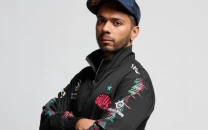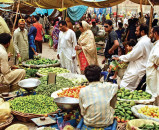How an ex-Karachi cop turned a down-and-out Houston community into his beat after 9/11
Muzaffar Siddiqi has encouraged more Muslims and Pakistanis to join the force.

How an ex-Karachi cop turned a down-and-out Houston community into his beat after 9/11
Today he works as part of the Houston Police Department’s Chief Command, and a liaison to the Pakistani and Muslim community. Siddiqi is an imposing figure - underneath his friendly demeanour one senses a core of steel.
He joined the force in 1996, after moving from Karachi where he worked as an officer. But his rise to prominence came after 9/11, when he worked with the Pakistanis and Muslims. As we chat, a photograph of him meeting President Obama looks over us, framed prominently in the room.
“The people here had no clue about Pakistanis. After 9/11, the Pakistani community and the Muslim community had become isolated,” says Siddiqi. “But we worked here, and told local Americans about who we were. There are 100,000 Pakistanis in Houston, and nearly a quarter of a million Muslims. We have a very good, strong position. We have doctors, engineers, businessmen. In fact, Pakistanis own 80% to 90% of the gas stations in Houston.”
But recently, there has been intensive reporting by the Associated Press about the NYPD spying on the Muslim community in the aftermath of 9/11. Has the Houston Police Department been affected by such stories? “I don’t know about the NYPD, but here, the community trusts us a lot. Even before 9/11, the community’s bonding with the police was very strong, and this made a lot of difference,” says Siddiqi. He cites that as part of the reason why there weren’t as many hate crimes against Muslims in the aftermath of the 9/11 attacks as there were in other parts of the country, and says that the Muslims have never had questions about spying. He adds that there has been research done here that shows that the Houston Police Department’s ties with the Muslim community are the strongest as compared to other police departments.
Houston has a sizeable Pakistani population, and along with it come the same kind of problems and crimes that others face. It used to just be white-collar crime, but as trust in the police went up, more and more people felt comfortable reporting a crime whether murder, shoplifting, family violence.
Siddiqi’s family too has been the victim of crime. In 2010, his brother-in-law was shot dead at his convenience store.
Siddiqi was the only Pakistani when he was part of the Houston Police Department. Now, seeing him as a role model, more Muslims and Pakistanis have joined the force.
“Our parents should understand that they shouldn’t just make their children choose [medicine] or engineer[ing] as a career. Because I always say that kids should go into journalism, or law enforcement – and now we see, slowly, that some are entering the law-enforcement area. The kids do want to come in [but] the parents don’t want [it].”
Even when he was joining the force in Houston his mother was worried and indeed, her concerns stay. But he firmly believes that if a community wants to be included in mainstream society it has to join every profession.
Officer Siddiqi also trains Pakistani police officers who come to Houston, and visits his hometown regularly. “The biggest change I noticed that the police in Pakistan is not independent. Perhaps
they’re a weapon of the politicians,” he says. Houston’s police is independent; they’re from the community and the community is the one supervising them.
“Our [Pakistani] police officers aren’t bad, they’re the best – but the system is broken,” he remarks. He understands that when your salary is low, you are tempted to accept bribes. A constable in Karachi, for example, earns Rs18,000 or about $180 a month. The difference is that in Houston, police can work extra jobs after their shift is over. It also helps that the Houston Police Department arrests its own men if they break the law.
As a solution, he suggests that Pakistani Americans should adopt police stations back home, and help them improve their facilities. “Our police morale is down. Our police officers, who are martyred, I don’t think their families are treated well.” Siddiqi wants to give back to the police in Pakistan would like to offer a scholarship to the children of any martyred police officer’s son or daughter.
He was inspired by Peshawar police officer, Commandant FC Sifwat Gayyur Khan, who was killed by a suicide bomber on August 4, 2010. “I was very impressed when I read his story. I want to name this scholarship after him.”
Published in The Express Tribune, August 11th, 2012.



















COMMENTS
Comments are moderated and generally will be posted if they are on-topic and not abusive.
For more information, please see our Comments FAQ